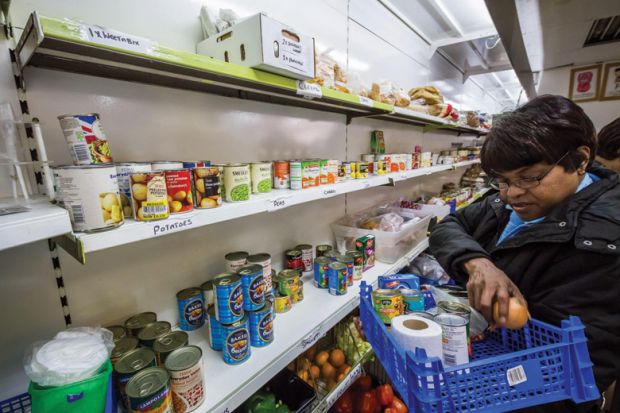Let them eat cake. It’s one of the most famous quotes – or misquotes, but you can’t help thinking it gets the gist – in history: the response of Marie Antoinette, the queen of France, to being told that the people had no bread to eat. Whatever the specifics, 18th-century French peasants reacted badly to her retort. They revolted, and subsequently cut off the head of the ruling elite with a little help from Madame Guillotine. More than two centuries later, Kayleigh Garthwaite’s Hunger Pains: Life inside Foodbank Britain presents an unsparingly honest and deeply troubling picture of food poverty in modern-day Britain – and, sadly, I really don’t expect revolution to be the result.
Garthwaite’s study is set in Stockton-on-Tees in the North East of England, a place that until almost the end of the last century was a bastion of working-class industrial life, with a proud and long history of cooperative movements and trade unions, self-determination and strong class identities. Since the deindustrialisation of the 1980s, Garthwaite recounts, Stockton has been gripped by unemployment and poverty. It’s a narrative we’ve become all too accustomed to telling and hearing when we talk about the North of England and look for the causes of poverty in contemporary society. And in some senses, sadly, Garthwaite’s book tells us little that we don’t already know, namely that the North of England is suffering. It didn’t recover after deindustrialisation, and working-class people are bearing the brunt of what many economists and political commentators suggest are the last days of capitalism. Nevertheless, Garthwaite’s book also offers something new and important, thanks to the closeness of its focus on the plight of those who are forced, through hunger, to ask for food in today’s Britain.
The difference here is that the author, a Durham University academic, is not a distant observer of this deprivation, theorising from afar. As Hunger Pains recounts, she becomes actively involved in the issue of food poverty in the neighbourhood where she lives. Recognising that there is real deprivation in her town, she visits her local food bank hoping to help out and volunteer, but quickly realises that she knows very little about how a food bank operates. Who works there? Who uses it? Where does the food come from? And what kinds of food are actually in a food bank? This is the study’s great strength: as Garthwaite recognises that she has little idea about what really happens when people use a food bank, the book becomes a journey not only for the reader, who learns about the process and the politics of food poverty, but also for the author herself.
Cleverly structured and easy to read and understand, Hunger Pains shines a clear light on the complexities of poverty, of stigma and of class inequality – complexities that are all too often muddied or oversimplified in print media, and cruelly distorted in the poverty porn flooding our television channels. Garthwaite makes the point that the politics of the food bank do not exist in a vacuum, and are linked to the stigmatisation of the poor and to government policies, in the wake of recession and low tax receipts, that have shifted the burden of the national debt on to the shoulders of those who have already suffered so much in Stockton-on-Tees and places like it.
From the off, there is no doubt about where Garthwaite’s study is going: it starts in the food bank and Garthwaite’s uneasy introduction as a food bank volunteer. Every chapter contains some of the field notes that she wrote after each of her shifts, and their detail and immediacy make the book unique and readable where other academic books are so often let down by the obvious gulf between the researcher and the researched. In recent years, I’ve read quite a few scholarly books on food bank use; it’s a fashionable subject, you might say, in the academic world. But this is the first one I’ve read that takes the reader step by step through the whole process; it even has very useful diagrams.
By chapter 3, Garthwaite shifts her focus to the politics of these services, and asks how we have moved in the UK from a relatively small sector of charity-run services to one that now has more than 1 million users. She offers a good explanation of the links between hunger and the Conservative government’s austerity measures, and in particular its sanctioning of the welfare benefits of some of the country’s poorest people. But the most stark and frightening evidence we encounter comes not from the accounts of those who use food banks, or from the author’s experience as a volunteer, but from the Conservative politicians Garthwaite quotes. When Iain Duncan Smith, the architect of the Tories’ welfare changes and until recently the minister overseeing those changes, is asked about the rise in food bank use, he attributes it to divorce, drug addiction and dysfunctional lives; Priti Patel, the employment minister, adds helpfully that food bank use is “complex” and not directly linked to welfare cuts or to benefit sanctions. Backbench Tory MP Charlotte Leslie suggests that food banks are positive additions to communities, “providing a model of how the state should interact with individuals”. And the politicians are not alone: they know all too well that there is a pervasive view that poverty is largely deserved and down to “poor choices” and bad behaviour.
Over a number of months, as Garthwaite settles in to her position as a volunteer at her local food bank, she gains the trust of the other volunteers and the food bank users. The voices she shares with us are brutally honest, and full of shame and heartbreak. Jessica, who is 23 and pregnant, walks the two miles to the food bank because she has no bus fare. Kim, who suffers from depression that eats away at her confidence as she repeatedly applies for jobs she never gets, has two daughters and is sick with worry about the effect that hunger and poverty are having on them. Threaded through these accounts, Garthwaite’s field notes convey her frustration, anger and sadness at what she is witnessing and has become a part of.
Garthwaite also interviews people who live in the city’s more affluent neighbourhoods, highlighting the tensions and contradictions in their views. Although affluent Stocktonites will admit that things aren’t good for some of their fellow citizens, they are largely unwilling to acknowledge it in more than a token manner. Most opt for some version of the line: “I’m happy food banks are there to feed the poor, but I still think it’s their fault.” Sadly, this probably sums up the national feeling about food bank use, and offers yet another indication of why there is so little sign of a revolution on the horizon. Speaking for myself, I am upset and angry that in 2016, in a country as wealthy as the UK, people such as Jessica and Kim and her children so often go to bed hungry, and burn with shame as they accept a cup of tea from a food bank volunteer while they wait for a charity handout of three days’ worth of food. I hope that everyone who reads this book ends up just as angry.
Lisa Mckenzie is research fellow in the department of sociology, London School of Economics, and author of Getting By: Estates, Class and Culture in Austerity Britain (2014).
Hunger Pains: Life inside Foodbank Britain
By Kayleigh Garthwaite
Policy Press, 176pp, £14.99 and £9.99
ISBN 9781447329114 and 9138 (e-book)
Published 14 June 2016
The author
 Kayleigh Garthwaite was born and raised in a former coal mining village in County Durham. “From when I was 10, it was just me and mam, and that has definitely shaped who I am in a lot of ways. Everyone always says I’m very much like my gran, too. She’s 89 and I don’t feel right if I don’t speak to her most days on the phone.”
Kayleigh Garthwaite was born and raised in a former coal mining village in County Durham. “From when I was 10, it was just me and mam, and that has definitely shaped who I am in a lot of ways. Everyone always says I’m very much like my gran, too. She’s 89 and I don’t feel right if I don’t speak to her most days on the phone.”
Now a postdoctoral research associate in the department of geography at Durham University, Garthwaite lives “in the same terraced street I’ve lived in since I was 3 years old. Me and my husband Craig live next door to my mam and have done for the past six years. I’m always ringing her up asking to borrow something or other.”
She recalls being “a shy but capable child. My mam always said I couldn’t get enough of books. I never wanted to go to college to do A levels, but after a business and administration AVCE [Advanced Vocational Certificate of Education] course I was signed up for at the local college was cancelled two weeks before I was due to start, my hand was forced.
“I found myself doing A levels at the local further education college. They only had a handful of subjects on offer and I signed up to them all, apart from fine art. This was where I first discovered sociology. I’d never even heard of it before, but found myself fascinated. Often I was the only person who turned up for the class, so I got one-on-one tuition from the tutor, Stephen. He encouraged me to apply to university, and without him and the encouragement from my mam, I doubt I’d have ever had the confidence to apply to study sociology at Durham University”.
As an undergraduate, she says, “I was one of those people who would have their essay ready to hand in a week before the deadline – you would never find me staying up all night to finish an assignment. I always preferred writing essays and research to discussing topics in seminars.”
In 2015, Garthwaite and her supervisor, Claire Bambra, professor of public health geography at Durham, presented oral and written evidence on benefits delivery and sanctions to the House of Commons Select Committee on Work and Pensions.
“I gave evidence based on people I met at the foodbank who had been sanctioned while receiving ESA. Whether the government will heed the report’s recommendations remains to be seen, but I was pleased I gave evidence. People at the foodbank told me many times that they want the government to know what life is like for them.”
During the course of her research, Garthwaite spoke to better-off residents of Stockton-on-Tees and asked their views on foodbank users. Did she feel that they were reluctant to tell an academic just how negatively they viewed struggling fellow Stocktonites?
“Not at all. People always spoke frankly about so-called ‘poor people’, and of course sometimes I would disagree. When people talked about foodbank users spending their money on drugs, alcohol and cigarettes it came from a lack of understanding of how a foodbank actually operates. There was a commonly held idea that anybody could walk in, pick whatever they liked off the shelves, and walk back out again.
“Mostly, people in the more affluent areas were shocked that foodbanks had to exist. They often asked me what problems the people who used it were dealing with. Obviously things such as sanctions, low pay, benefit delays tended not to be part of people’s everyday lives in the more affluent areas. Well, I’ll be giving them copies of the book, so I hope they read it! They’re invited to the launch event inside the foodbank, too.”
If she were able to change one thing about Durham University, Garthwaite says, it would be to have “more students from working class backgrounds. When I was an undergraduate, there were only a handful of other students like me on the course. Someone once told me in a seminar they couldn’t understand my North East accent, and another corrected the way I pronounced the word ‘glass’. It was hard to get used to being in the minority at a university that was on my own doorstep.”
What gives her hope?
“That’s a really hard question. I can’t think of an answer that doesn’t sound massively clichéd! I think in terms of the work I’ve been doing in the foodbank; it’s always inspiring to see someone who has been helped out with a food parcel come back when they’re on their feet again to tell us volunteers. Sometimes people bring in food, or give donations, and others get involved as volunteers themselves. I suppose that gives me hope.”
Karen Shook
后记
Print headline: No cake and little sympathy




